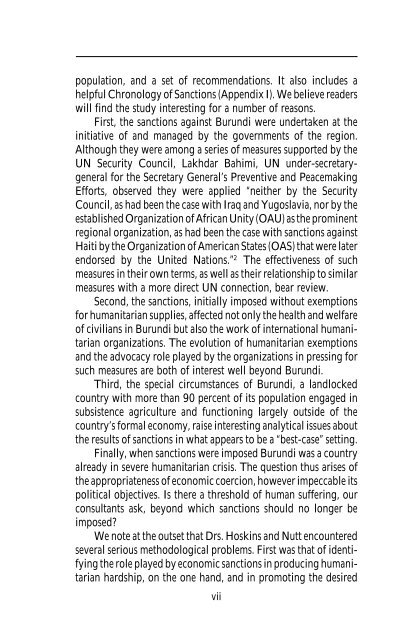The humanitarian impacts of economic sanctions on Burundi
The humanitarian impacts of economic sanctions on Burundi
The humanitarian impacts of economic sanctions on Burundi
Create successful ePaper yourself
Turn your PDF publications into a flip-book with our unique Google optimized e-Paper software.
populati<strong>on</strong>, and a set <str<strong>on</strong>g>of</str<strong>on</strong>g> recommendati<strong>on</strong>s. It also includes a<br />
helpful Chr<strong>on</strong>ology <str<strong>on</strong>g>of</str<strong>on</strong>g> Sancti<strong>on</strong>s (Appendix I). We believe readers<br />
will find the study interesting for a number <str<strong>on</strong>g>of</str<strong>on</strong>g> reas<strong>on</strong>s.<br />
First, the <str<strong>on</strong>g>sancti<strong>on</strong>s</str<strong>on</strong>g> against <strong>Burundi</strong> were undertaken at the<br />
initiative <str<strong>on</strong>g>of</str<strong>on</strong>g> and managed by the governments <str<strong>on</strong>g>of</str<strong>on</strong>g> the regi<strong>on</strong>.<br />
Although they were am<strong>on</strong>g a series <str<strong>on</strong>g>of</str<strong>on</strong>g> measures supported by the<br />
UN Security Council, Lakhdar Bahimi, UN under-secretarygeneral<br />
for the Secretary General’s Preventive and Peacemaking<br />
Efforts, observed they were applied “neither by the Security<br />
Council, as had been the case with Iraq and Yugoslavia, nor by the<br />
established Organizati<strong>on</strong> <str<strong>on</strong>g>of</str<strong>on</strong>g> African Unity (OAU) as the prominent<br />
regi<strong>on</strong>al organizati<strong>on</strong>, as had been the case with <str<strong>on</strong>g>sancti<strong>on</strong>s</str<strong>on</strong>g> against<br />
Haiti by the Organizati<strong>on</strong> <str<strong>on</strong>g>of</str<strong>on</strong>g> American States (OAS) that were later<br />
endorsed by the United Nati<strong>on</strong>s.” 2 <str<strong>on</strong>g>The</str<strong>on</strong>g> effectiveness <str<strong>on</strong>g>of</str<strong>on</strong>g> such<br />
measures in their own terms, as well as their relati<strong>on</strong>ship to similar<br />
measures with a more direct UN c<strong>on</strong>necti<strong>on</strong>, bear review.<br />
Sec<strong>on</strong>d, the <str<strong>on</strong>g>sancti<strong>on</strong>s</str<strong>on</strong>g>, initially imposed without exempti<strong>on</strong>s<br />
for <str<strong>on</strong>g>humanitarian</str<strong>on</strong>g> supplies, affected not <strong>on</strong>ly the health and welfare<br />
<str<strong>on</strong>g>of</str<strong>on</strong>g> civilians in <strong>Burundi</strong> but also the work <str<strong>on</strong>g>of</str<strong>on</strong>g> internati<strong>on</strong>al <str<strong>on</strong>g>humanitarian</str<strong>on</strong>g><br />
organizati<strong>on</strong>s. <str<strong>on</strong>g>The</str<strong>on</strong>g> evoluti<strong>on</strong> <str<strong>on</strong>g>of</str<strong>on</strong>g> <str<strong>on</strong>g>humanitarian</str<strong>on</strong>g> exempti<strong>on</strong>s<br />
and the advocacy role played by the organizati<strong>on</strong>s in pressing for<br />
such measures are both <str<strong>on</strong>g>of</str<strong>on</strong>g> interest well bey<strong>on</strong>d <strong>Burundi</strong>.<br />
Third, the special circumstances <str<strong>on</strong>g>of</str<strong>on</strong>g> <strong>Burundi</strong>, a landlocked<br />
country with more than 90 percent <str<strong>on</strong>g>of</str<strong>on</strong>g> its populati<strong>on</strong> engaged in<br />
subsistence agriculture and functi<strong>on</strong>ing largely outside <str<strong>on</strong>g>of</str<strong>on</strong>g> the<br />
country’s formal ec<strong>on</strong>omy, raise interesting analytical issues about<br />
the results <str<strong>on</strong>g>of</str<strong>on</strong>g> <str<strong>on</strong>g>sancti<strong>on</strong>s</str<strong>on</strong>g> in what appears to be a “best-case” setting.<br />
Finally, when <str<strong>on</strong>g>sancti<strong>on</strong>s</str<strong>on</strong>g> were imposed <strong>Burundi</strong> was a country<br />
already in severe <str<strong>on</strong>g>humanitarian</str<strong>on</strong>g> crisis. <str<strong>on</strong>g>The</str<strong>on</strong>g> questi<strong>on</strong> thus arises <str<strong>on</strong>g>of</str<strong>on</strong>g><br />
the appropriateness <str<strong>on</strong>g>of</str<strong>on</strong>g> <str<strong>on</strong>g>ec<strong>on</strong>omic</str<strong>on</strong>g> coerci<strong>on</strong>, however impeccable its<br />
political objectives. Is there a threshold <str<strong>on</strong>g>of</str<strong>on</strong>g> human suffering, our<br />
c<strong>on</strong>sultants ask, bey<strong>on</strong>d which <str<strong>on</strong>g>sancti<strong>on</strong>s</str<strong>on</strong>g> should no l<strong>on</strong>ger be<br />
imposed?<br />
We note at the outset that Drs. Hoskins and Nutt encountered<br />
several serious methodological problems. First was that <str<strong>on</strong>g>of</str<strong>on</strong>g> identifying<br />
the role played by <str<strong>on</strong>g>ec<strong>on</strong>omic</str<strong>on</strong>g> <str<strong>on</strong>g>sancti<strong>on</strong>s</str<strong>on</strong>g> in producing <str<strong>on</strong>g>humanitarian</str<strong>on</strong>g><br />
hardship, <strong>on</strong> the <strong>on</strong>e hand, and in promoting the desired<br />
vii
















